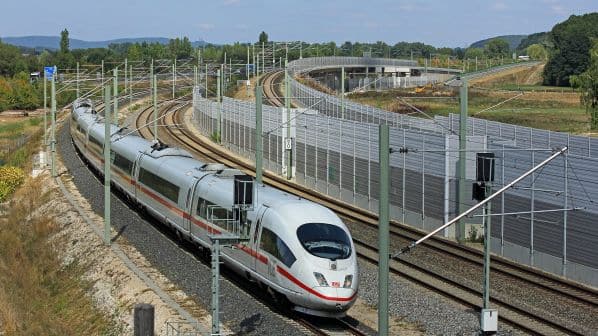A German plan to attract domestic air passengers to rail is proving successful, with passenger numbers on rail services growing at a faster rate than comparative air services.
The German Aviation Association (BDL) and German Rail (DB) launched a joint action plan in April 2021 to strengthen integration between air and rail.
In the first half of 2023, domestic German air traffic is expected to reach around 56% of 2019 levels. Although air travel is increasing after the Covid-19 pandemic, DB says there is evidence of a trend towards a further shift of domestic short-haul air traffic to rail. In particular, the use of DB’s ICE Sprinter services is increasing, with passenger numbers 45% higher in 2022 compared with 2019.
In addition, the expanded feeder services and offers such as Lufthansa Express Rail have contributed significantly to the success of the action plan. In 2021, demand for the joint feeder service offered by DB and Lufthansa to Frankfurt Airport matched 2019 levels by October, and in 2022 demand increased by another 25%.
The Lufthansa Express Rail service, which enables Lufthansa passengers to book a journey including train travel to and from Frankfurt Airport on a DB ICE service with a single ticket, now runs to 24 destinations in Germany, and the number of services has almost doubled from 135 to 240 trains a day.
Since Münster was included in the Lufthansa Express Rail network and the service to Frankfurt Airport was further improved with more ICE stops and hourly trains, demand has increased by 27%.
DB’s Sprinter network has also grown to 11 lines. New direct connections to Frankfurt Airport - the central hub for air traffic in Germany - were introduced with the timetable change in December, increasing the number of seats available to Frankfurt Airport by up to 60% this year compared with 2022.
“Wherever aviation and rail cooperate, we record double-digit growth rates,” says DB board member for long-distance passenger transport, Mr Michael Peterson. “Part of this success is our expanded feeder services to Germany's largest airport in Frankfurt. If we succeed in intelligently linking the modes of transport, we will win more people for climate-friendly mobility chains.”
“We are improving the mobility offer for travellers, making a contribution to climate protection in the transport sector and ensuring the competitiveness of the German air transport industry,” says BDL president, Mr Jost Lammers. “However, to make further progress, we also need the support of the federal government for accelerated infrastructure development.”

